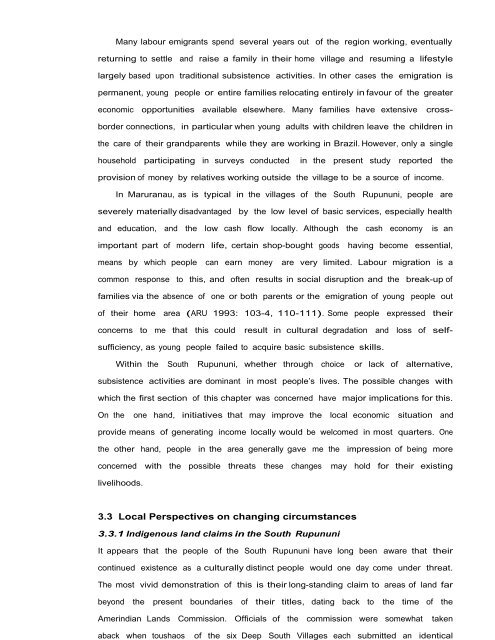Ethnoecology, Resource Use, Conservation And Development In A ...
Ethnoecology, Resource Use, Conservation And Development In A ...
Ethnoecology, Resource Use, Conservation And Development In A ...
Create successful ePaper yourself
Turn your PDF publications into a flip-book with our unique Google optimized e-Paper software.
Many labour emigrants spend several years out of the region working, eventually<br />
returning to settle and raise a family in their home village and resuming a lifestyle<br />
largely based upon traditional subsistence activities. <strong>In</strong> other cases the emigration is<br />
permanent, young people or entire families relocating entirely in favour of the greater<br />
economic opportunities available elsewhere. Many families have extensive cross-<br />
border connections, in particular when young adults with children leave the children in<br />
the care of their grandparents while they are working in Brazil. However, only a single<br />
household participating in surveys conducted in the present study reported the<br />
provision of money by relatives working outside the village to be a source of income.<br />
<strong>In</strong> Maruranau, as is typical in the villages of the South Rupununi, people are<br />
severely materially disadvantaged by the low level of basic services, especially health<br />
and education, and the low cash flow locally. Although the cash economy is an<br />
important part of modern life, certain shop-bought goods having become essential,<br />
means by which people can earn money are very limited. Labour migration is a<br />
common response to this, and often results in social disruption and the break-up of<br />
families via the absence of one or both parents or the emigration of young people out<br />
of their home area (ARU 1993: 103-4, 110-111). Some people expressed their<br />
concerns to me that this could result in cultural degradation and loss of self-<br />
sufficiency, as young people failed to acquire basic subsistence skills.<br />
Within the South Rupununi, whether through choice or lack of alternative,<br />
subsistence activities are dominant in most people’s lives. The possible changes with<br />
which the first section of this chapter was concerned have major implications for this.<br />
On the one hand, initiatives that may improve the local economic situation and<br />
provide means of generating income locally would be welcomed in most quarters. One<br />
the other hand, people in the area generally gave me the impression of being more<br />
concerned with the possible threats these changes may hold for their existing<br />
livelihoods.<br />
3.3 Local Perspectives on changing circumstances<br />
3.3.1 <strong>In</strong>digenous land claims in the South Rupununi<br />
It appears that the people of the South Rupununi have long been aware that their<br />
continued existence as a culturally distinct people would one day come under threat.<br />
The most vivid demonstration of this is their long-standing claim to areas of land far<br />
beyond the present boundaries of their titles, dating back to the time of the<br />
Amerindian Lands Commission. Officials of the commission were somewhat taken<br />
aback when toushaos of the six Deep South Villages each submitted an identical


